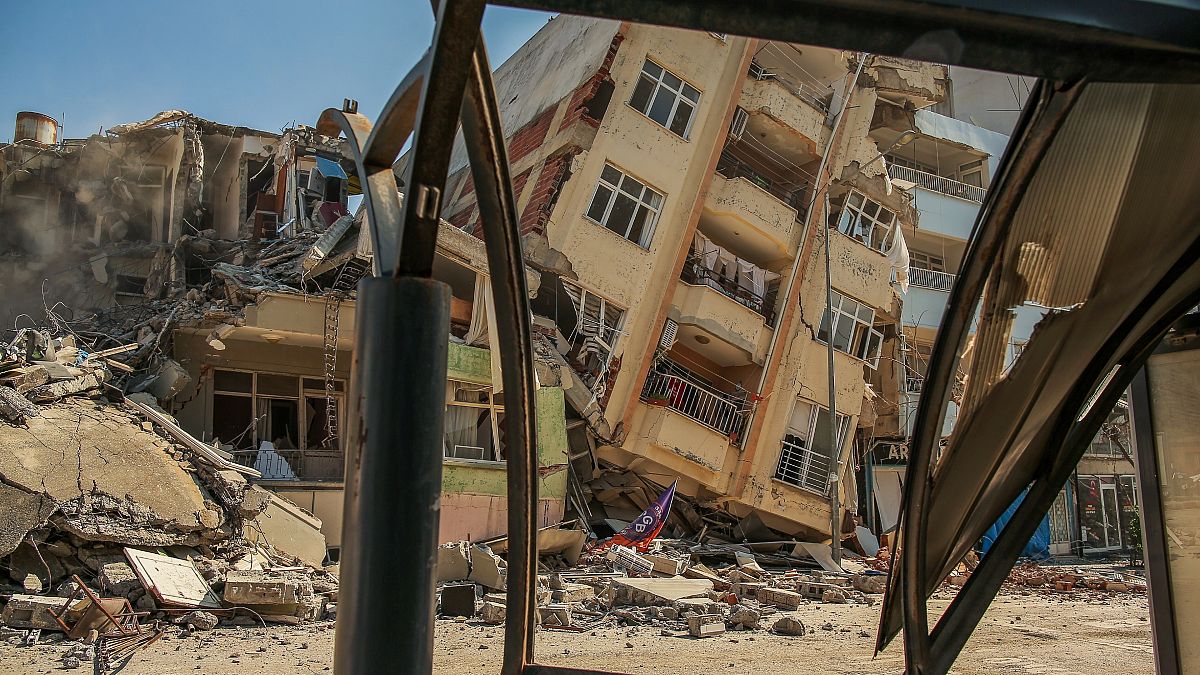The International Rescue Committee said 'displacement sites really just don't have the capacity to host that many people,' as millions of people lose their homes in Turkey and Syria.
A month after the devastating earthquakes in south-eastern Turkey and the border areas of Syria, aid agencies are still noticing a severe shortage of basic materials to help those who have survived the disaster.
Two earthquakes of magnitude 7.7 and 7.6 collapsed thousands of homes in cities where millions of people lived.
After the earthquake on 6 February, 2.7 million people were forced to leave their homes, which had been either damaged or destroyed.
But surviving a natural disaster, is only half the battle. Surviving without a roof over their heads, in the cold winter, with completely destroyed infrastructure and a lack of basic necessities, such as drinking water, are the main challenges for all survivors of the earthquake.
This is the problem faced by those who were lucky enough to escape during the night, and those who were rescued from under the rubble.
Has international assistance helped?
One of the many international humanitarian missions in the region is the International Rescue Committee, which has been working in the region for a number of years, first because of the military conflict in Syria and now because of the devastating series of earthquakes in the Turkey-Syria border region.
Euronews spoke to the International Rescue Committee Coordinator, Jennifer Higgins, to find out more.
How are things today?
"The pressing needs of the survivors are really similar. And those needs are really focused on shelter, food, hygiene, supplies, basic sanitation facilities, bathrooms, clean water, and also just basic household items."
"In Turkey, we know that this earthquake has displaced an estimated 2.7 million people. But displacement sites really just don't have the capacity to host that many people. And they can only really host a fraction of the country's IDPs (internally-displaced people) [...] Our staff have also been telling us that shelter is so pressing not only for those who have lost their homes, but also for many who
just can't go back to their homes, even if they haven't been destroyed." added Higgins.
Access to affected areas in Syria is difficult
Hundreds of thousands of Syrian refugees, who had already lost their homes to war years before, find themselves in the same situation.
"In northwest Syria, before the earthquake, humanitarian needs were already at an all time high. And there were about 4.1 million people dependent on humanitarian assistance. This is 90% of the population in that area. And also half of this population before the earthquake were already internally displaced with limited access to services. And, you just can't divorce what the needs were in northwest Syria before the earthquake from what's happened now after, because humanitarian organisations such as the International Rescue Committee were already signalling about this dire humanitarian situation and that there wasn't enough humanitarian assistance being able to get into those people who need us," explained Higgins.
"In northwest Syria, the problem is exacerbated by a lack of access to the affected area with the majority of humanitarian aid being delivered through a single border crossing point with Turkey."
Is enough aid coming in, considering the scale of the humanitarian disaster?
"We have seen actually a very positive global collective effort to support and especially Turkey in this time of need," said Higgins. "We've really been welcoming this escalation of really collective support from across the world and for the response in Turkey."
Are essential goods managing to reach the earthquake-affected populations?
"This area in northwest Syria was already so difficult to access as I mentioned. There is no doubt that we will start facing some problems in the supply of certain goods considering the scale of the needs. Some goods, including tents are in high demand and becoming hard to source from what we have heard. What is essential now is that all avenues to reach those affected by the earthquake through the most direct and efficient routes must be ensured, in order to provide unfettered humanitarian access to those in need wherever they are, so that more lives are not needlessly lost."
What other support is needed?
But some of the elements needed to save people cannot be expressed in concrete numbers. For example, psychological help for children, and support for desperate adults who have lost close relatives.
"We really need to start thinking about providing mental health and psychosocial support. And this is something that we've been working to already do in the International Rescue Committee and to provide services to our communities to be able to recover from this, because, you can provide people with the physical ability to stay somewhere, but if they mentally don't feel safe, they're not going to be able to stay there. So we it's a really a key aspect that we need to be thinking about." explained Higgins.
Many of those impacted by the earthquakes are now in need of financial support as they've lost their livelihoods: "In Turkey, there was a huge impact, for example, on the agricultural sector. In northwest Syria, nearly every household that we surveyed in a needs assessment said that they had had their ability to generate income damaged and that nearly 90% of people had to borrow money from somewhere in order to survive," said Higgins.
